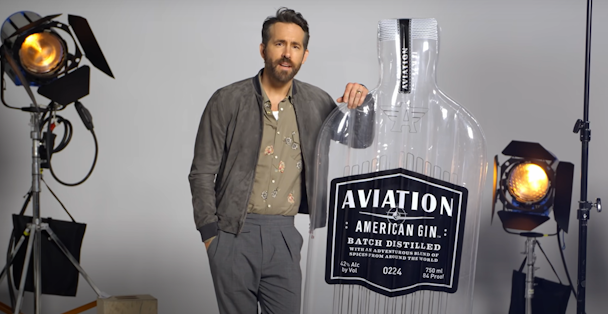Have we reached peak Ryan Reynolds?
After T-Mobile snapped up Mint Mobile, Natalie Burns, strategy partner at brand agency UnitedUs, cautions brands built on the celebrity halo effect.

Reynolds-backed brand Aviation American Gin teamed up with British Airways
It’s a good time to be Ryan Reynolds; not only is Wrexham AFC looking good for promotion, but his venture Mint Mobile’s recent sale to T-Mobile has also pocketed him a cool $280m. It’s the latest sale of brands in Reynolds’s Maximum Effort stable and follows the 2020 sale of Aviation Gin to drinks heavyweight Diageo for more than $600m.
These are brands that have been built on Reynolds’s kind, yet off-beat sense of humor. Initially made famous by his appearances in the Deadpool film franchise, Reynolds has cleverly transposed it into his off-screen persona and then his brands. It’s been hugely successful, effortlessly building trust and humanizing the brands.
But will this turn out to be the deal T-Mobile expects it to be? Have we reached peak Reynolds?
Advertisement
A dimming halo
There’s no doubt the companies have benefited from the halo effect of Reynolds’s celebrity brand, but to continue diversifying and growing businesses across Reynolds’s investment portfolio, they’re going to need to give these businesses their own brands independent of the star. A joke is funny when you hear it the first time, but when you keep hearing the same joke with a different logo on it, it loses its impact.
For years, these businesses have relied heavily on Reynolds’s cultural capital to gain recognition and success, but what happens now that he’s no longer at the forefront? One has to question if these brands have invested enough in what makes them truly distinctive beyond Reynolds’s star power.
Advertisement
Take a stroll down any city street and ask the average person what they know about Aviation Gin. Could they tell you anything other than it was owned by Ryan Reynolds? This lack of clear messaging and mythology leaves a gaping hole in the brand's identity, especially when compared to the rest of the Diageo portfolio.
Consider Tanqueray 10, for instance. Diageo has masterfully crafted a narrative around this ultra-premium gin as the first of its kind, carefully crafted by Tanqueray's master distillers and beloved by cocktail bartenders worldwide. From its iconic bottle design to its wax seal inlay, every detail is carefully considered to position Tanqueray 10 as the go-to gin for discerning drinkers seeking a well-crafted product. In contrast, the story of Aviation Gin feels incomplete without Reynolds. The question remains: what is the brand's true value proposition, beyond the celebrity endorsement?
I do wonder if selling the businesses to the T-Mobiles and Diageos of the world, who can bring the marketing resources these brands will need to move into that next phase is a tacit admission that these brands need to evolve.
Suggested newsletters for you
More Peep Show less Deadpool
The biggest question facing T-Mobile now is how can it take the Reynolds audience with it on this latest journey. This is particularly amplified when you’ve got a big player buying a business that's been known or perceived as a market disruptor.
You can almost hear the deflated sigh of customers as they learn about the sale and realize that their beloved brand might not be as innovative anymore, they're now part of the establishment. You only have to look at the comments on YouTube about the announcement to get the sense that Mint users are less than thrilled with the sale. From the irony, “I use Mint to avoid big phone companies like T-Mobile” to the nearly poetic, “my heart sank. It’s like thousands of voices cried out all at once and were suddenly silenced.”
What’s worrying me most of all about this is the ad they ran to announce the sale. It reminded me of an old Mitchell and Webb Apple ad. Instead of Webb’s ’Mac’ we have cool Reynolds, and Mitchell’s establishment, old-school PC is T-Mobile. What made those adverts triumphant was the tongue-in-cheek attitude that told customers, Mac is cool. You need T-Mobile to look cool because that’s the company that will continue to exist, but it didn’t – it amplified the diminishing of the T-Mobile brand. It’s the ad equivalent of moving back in with your parents, and it suggests T-Mobile aren’t really aware of the task they’ve taken on here.
Moving on from founders
It’s an old story really. Charismatic founder builds brand on their personal gravitational pull, and quickly saturates potential so sells to marketing behemoth which rapidly alienates existing customers and employees alike.
In many cases, the primary goal is simply to retain the stand-out talent as it's absorbed into the new parent business. This is especially important when the talent in question is the driving force behind the brand's success. Without the independence they once enjoyed, and without the reflected light of a celebrity founder like Reynolds, will the Mint folk be happy to make the shift to T-Mobile? Or will they suffer the talent drain that many go through in an acquisition, losing the value of the business beyond its customer base and IP.
Of course, it doesn’t have to go that way. T-Mobile may already have a strategy to marble the Reynolds brand through a bigger marketing push to a wider audience while retaining valuable talent within the organization. It’ll be interesting to see how it plays out.
